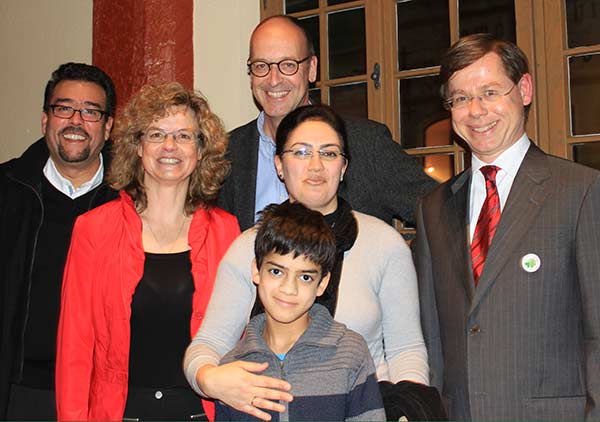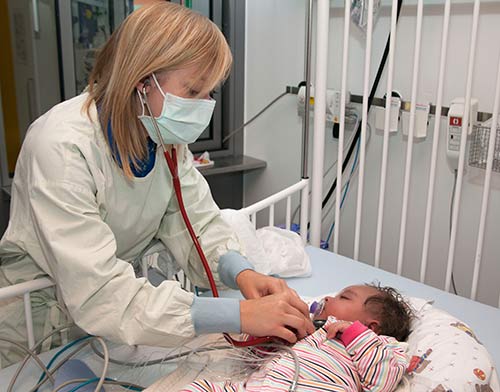Our Stories
Sulin’s Legacy
 Sulin, a seven-year-old girl suffering from liver failure, was the inspiration for Care-for-Rare. Her doctors thought the only way to cure her was a liver transplant. Thanks to collaborative research at the National Institutes of Health in Bethesda, Maryland; Europe; and South America, Sulin was eventually diagnosed with a previously unknown disease of the immune system, now called Interleukin-21-Receptor-Deficiency. She was the first person in the world to be identified with the disease, but not the last.
Sulin, a seven-year-old girl suffering from liver failure, was the inspiration for Care-for-Rare. Her doctors thought the only way to cure her was a liver transplant. Thanks to collaborative research at the National Institutes of Health in Bethesda, Maryland; Europe; and South America, Sulin was eventually diagnosed with a previously unknown disease of the immune system, now called Interleukin-21-Receptor-Deficiency. She was the first person in the world to be identified with the disease, but not the last.
Sadly for Sulin, the discovery came too late. Before she died, she told us that we should not give up so that other children can be cured. We have taken her wish to heart and strive to achieve that mission every day: Care-for-Rare America is committed to providing all children with rare diseases a correct diagnosis by genome sequencing and other cutting-edge technologies.
Sevkan’s Promise
 When we met Sevkan for the first time, he was a seven-year-old boy who had spent more than half of his life in the hospital — more specifically, a dozen different hospitals. Doctors did not know how to control his bloody diarrhea, ulcers, and severe intestinal inflammation. Following successful research by Care-for-Rare scientists, the cause of his rare disease was identified (Interleukin-10-Receptor-Deficiency) and a new type of curative therapy was offered. Thanks to a stem cell transplant, Sevkan is now cured.
When we met Sevkan for the first time, he was a seven-year-old boy who had spent more than half of his life in the hospital — more specifically, a dozen different hospitals. Doctors did not know how to control his bloody diarrhea, ulcers, and severe intestinal inflammation. Following successful research by Care-for-Rare scientists, the cause of his rare disease was identified (Interleukin-10-Receptor-Deficiency) and a new type of curative therapy was offered. Thanks to a stem cell transplant, Sevkan is now cured.
Even though this is the greatest reward for Care-for-Rare, the impact reaches further. We promised Sevkan that we would help many other children around the world suffering from similar life-threatening diseases. Today, the Very Early Onset Inflammatory Bowel Disease network — coordinated by the Boston Children’s Hospital in Massachusetts in collaboration with hospitals in Toronto, Canada and Munich, Germany — orchestrates a worldwide effort to understand the genetic basis and disease mechanisms of early-onset inflammatory bowel diseases and to develop definitive cures.
Veronika’s Example
 Veronika suffered from a very rare blood disorder since early childhood. Like many other children, she benefited from Care-for-Rare science: Thanks to an international team of researchers in the United States, France, Austria, Germany, the United Kingdom, Iran, and Israel, the cause of her disease was identified. Shuttling proteins in cells requires a highly coordinated machinery — Veronika lacked a “cargo-protein” in her immune cells. As a consequence, what occurs in an orderly way in healthy cells was disordered in Veronika’s cells.
Veronika suffered from a very rare blood disorder since early childhood. Like many other children, she benefited from Care-for-Rare science: Thanks to an international team of researchers in the United States, France, Austria, Germany, the United Kingdom, Iran, and Israel, the cause of her disease was identified. Shuttling proteins in cells requires a highly coordinated machinery — Veronika lacked a “cargo-protein” in her immune cells. As a consequence, what occurs in an orderly way in healthy cells was disordered in Veronika’s cells.
The new knowledge helped to cure her and she decided to become a physician and researcher herself! While Veronika does not need any special awareness training, many other clinicians and scientists benefit from Care-for-Rare training fellowships. Dedicated to educating and inspiring the most promising doctors and scientists, Care-for-Rare has implemented short-term and long-term training opportunities at many of the finest medical institutions in the United States.
